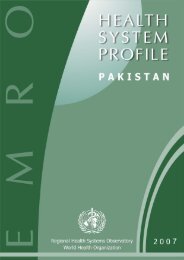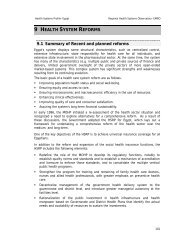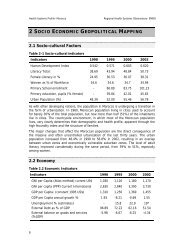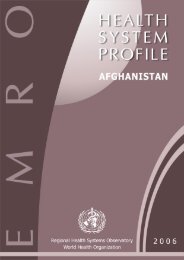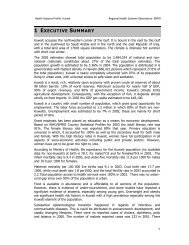The role of contractual arrangements in improving health sector ...
The role of contractual arrangements in improving health sector ...
The role of contractual arrangements in improving health sector ...
Create successful ePaper yourself
Turn your PDF publications into a flip-book with our unique Google optimized e-Paper software.
<strong>The</strong> <strong>role</strong> <strong>of</strong> <strong>contractual</strong> <strong>arrangements</strong> <strong>in</strong> improv<strong>in</strong>g <strong>health</strong> <strong>sector</strong> performance<br />
<strong>The</strong> capacity <strong>of</strong> private <strong>sector</strong> providers also varies among countries <strong>of</strong> the Region.<br />
Nongovernmental organizations are more actively <strong>in</strong>volved <strong>in</strong> the delivery <strong>of</strong> primary<br />
<strong>health</strong> services <strong>in</strong> some countries, especially Afghanistan and Pakistan. Other countries<br />
such as Egypt are pilot<strong>in</strong>g <strong>in</strong>ternal contracts with the reformed district provider<br />
organizations, as well as external contracts with private providers. <strong>The</strong>re is abundant<br />
experience with contract<strong>in</strong>g out <strong>of</strong> secondary and tertiary services to private providers <strong>in</strong><br />
Jordan, Lebanon, Morocco and Tunisia.<br />
<strong>The</strong>re are several issues with the private providers. <strong>The</strong> most important <strong>of</strong> these are<br />
the quality <strong>of</strong> services provided, and the accreditation <strong>of</strong> the providers. This is especially<br />
the case <strong>in</strong> Afghanistan, Egypt, Lebanon Morocco, Pakistan and Tunisia. Skilled<br />
managerial capacity is lack<strong>in</strong>g among private providers, and their technical and f<strong>in</strong>ancial<br />
capacities also vary widely. Private providers <strong>in</strong> Egypt, Jordan, Lebanon, Morocco and<br />
Tunisia have access to advanced medical technologies that make them attractive to<br />
contract with for secondary and tertiary care services.<br />
<strong>The</strong>re are a number <strong>of</strong> risks <strong>in</strong>herent <strong>in</strong> the contract<strong>in</strong>g process. <strong>The</strong>se <strong>in</strong>clude<br />
delayed payments; differ<strong>in</strong>g <strong>in</strong>terpretations <strong>of</strong> loosely-worded contracts; limited number<br />
<strong>of</strong> providers <strong>in</strong> rural areas; capture <strong>of</strong> contract<strong>in</strong>g process by vested <strong>in</strong>terests; and limited<br />
capacity for monitor<strong>in</strong>g and evaluation. Of these, monitor<strong>in</strong>g and evaluation is especially<br />
problematic, as the capacity to monitor contracts effectively is weak <strong>in</strong> most countries.<br />
With the exception <strong>of</strong> Egypt, performance <strong>in</strong>dicators are not adequately <strong>in</strong>cluded <strong>in</strong> the<br />
design <strong>of</strong> contract and, if <strong>in</strong>cluded, <strong>of</strong>ten are not used. Management <strong>in</strong>formation systems,<br />
especially those cover<strong>in</strong>g private providers, are largely <strong>in</strong>adequate to meet the<br />
requirements for monitor<strong>in</strong>g <strong>of</strong> performance and evaluation. Payment methods for most<br />
<strong>contractual</strong> <strong>arrangements</strong> are <strong>in</strong> the form <strong>of</strong> fee-for-service or block grants. Afghanistan<br />
has experience with payment based on capitation for a specified package <strong>of</strong> <strong>health</strong><br />
services.<br />
Interventions with contract<strong>in</strong>g as the implementation strategy<br />
Table 3 gives a summary <strong>of</strong> the specific <strong>in</strong>terventions with <strong>contractual</strong><br />
<strong>arrangements</strong>. All countries have experience with contract<strong>in</strong>g out <strong>of</strong> non-cl<strong>in</strong>ical services;<br />
however, Bahra<strong>in</strong>, Morocco and Syrian Arab Republic purchase ma<strong>in</strong>ly non-cl<strong>in</strong>ical<br />
support services. Morocco also has experience with purchase <strong>of</strong> cl<strong>in</strong>ical services.<br />
Afghanistan, Egypt, Islamic Republic <strong>of</strong> Iran, Lebanon and Pakistan have experience<br />
with contract<strong>in</strong>g out primary <strong>health</strong> care services, and Jordan, Lebanon and Tunisia<br />
extensively contract out hospital and ambulatory care services to private as well as public<br />
providers.<br />
25







